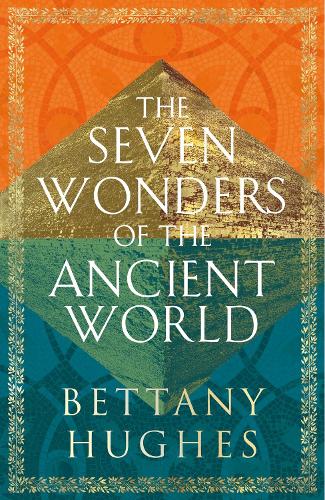
The Seven Wonders of the Ancient World
by Bettany Hughes
Genres: History, Non-fictionPages: 416
Rating:

Synopsis:Their names still echo down the ages: The Great Pyramid at Giza. The Hanging Gardens of Babylon. The Temple of Artemis. The statue of Zeus at Olympia. The mausoleum of Halikarnassos. The Colossus at Rhodes. The Lighthouse of Alexandria. The Seven Wonders of the World were staggeringly audacious impositions on our planet. They were also brilliant adventures of the mind, test cases of the reaches of human imagination. Now only the pyramid remains, yet the scale and majesty of these seven wonders still enthrall us today.
In a thrilling, colorful narrative enriched with the latest archaeological discoveries, bestselling historian Bettany Hughes walks through the landscapes of both ancient and modern time; on a journey whose purpose is to ask why we wonder, why we create, why we choose to remember the wonder of others. She explores traces of the Wonders themselves, and the traces they have left in history. A majestic work of historical storytelling, The Seven Wonders of the Ancient World reinforces the exciting, and nourishing, notion that humans can make the impossible happen.
It took me a while to properly get into Bettany Hughes’ The Seven Wonders of the Ancient World, and I’m not quite sure why. In many ways it’s right up my street, after all, telling a bit of a history of Babylonia, Greece, Egypt, and other lands in that area, and the afterlife of their cultures as well. But I think it was just a bit slower and more lingering than I was in the mood for at first — and certainly I came to appreciate it as I got into the pace of the book, and to appreciate that it carefully puts each of the wonders into their context. Rather than just talking about “Ancient Greece”, Hughes is careful to contextualise the different peoples (and the rivalries between them), rather than lump everyone into a big group.
Sometimes it does feel a bit frustrating: could the Hanging Gardens be X? Could they be Y? Maybe they’re none of those things and they’re actually Z? But of course Hughes isn’t to blame for the fragmentary evidence we have, and she does a pretty good job at teasing out the implications of what data we do have.
I do also very much appreciate the time Hughes spent on picking apart the afterlife of the Wonders: what can be seen of them today, what fragments might remain, and the ways later civilisations have copied and reflected them.
So, all in all, a slow read, but a worthwhile one if you’re interested in the ancient civilisations in that area of the world. Of course it misses out many wonders, particularly ones less central to Western imaginations, but that’s because the very premise is based on an ancient and semi-local list. Still, maybe a more focused title would be nice… there’s a lot of “ancient world” that isn’t included in this book at all.
Rating: 4/5
